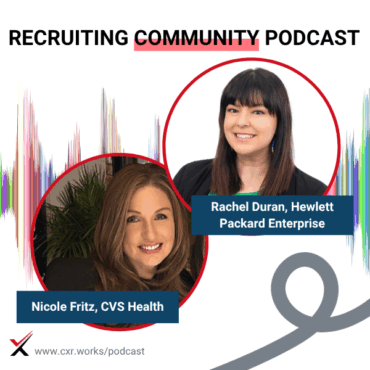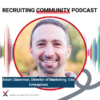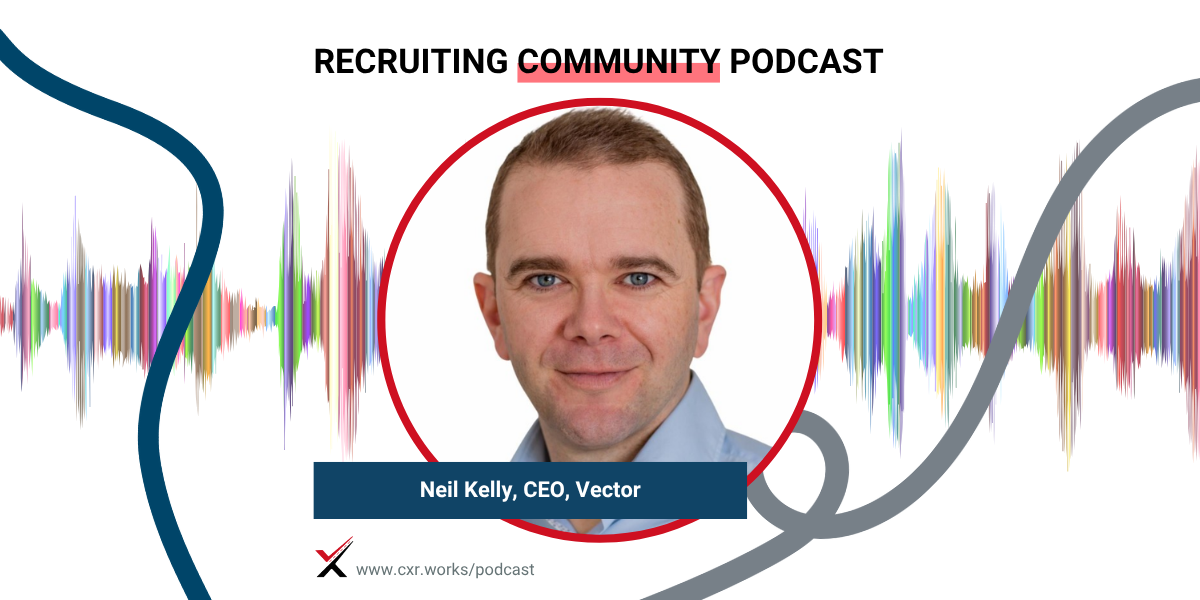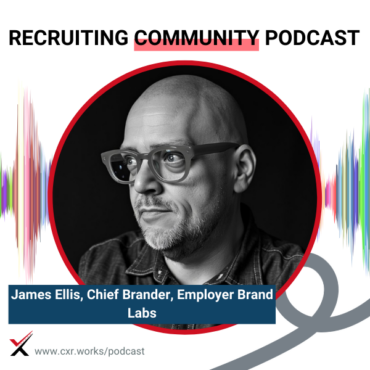
Employer Branding & Recruitment Marketing
How do employer branding and recruitment marketing really work together? Two TA leaders share insights from the latest CXR research panel.
 play_arrow
play_arrow
Talent Chooses You: Reframing the Role of TA in Driving Growth Cami Grace
 play_arrow
play_arrow
Inside the Cox Career Site Redesign: Data, AI & Candidate Experience Cami Grace
 play_arrow
play_arrow
Vietnam TA/HR Delegation Recap Cami Grace
 play_arrow
play_arrow

Episode Overview:
In this episode Neil Kelly, CEO of Vector joins us for a vibrant discussion centered on the recruitment industry’s standards and practices, particularly focusing on the role of transparency, ethical behavior, and establishing clear standards within talent acquisition. The conversation navigated through the experiences and insights addressing the implications of regulatory influences and the pressing need for professional standards in recruitment.
Key Topics Covered:
Transparency and Ethical Standards:
The need for establishing clear and ethical recruitment practices to ensure fair treatment of candidates and improve the industry’s reputation.
Impact of Regulation:
Discussion on how governmental regulations might impact recruitment practices negatively or positively, and the role of the recruitment community in shaping these regulations.
Professional Standards and Education:
Emphasis on the importance of continuous education for recruiters and the development of industry-wide standards to guide recruitment practices.
Closing Notes:
The episode concluded with a call to action for professionals within the recruitment industry to participate actively in shaping the future of recruitment through ethical practices and embracing technology responsibly.
Title:
Global Recruiting Standards
Featured Guests:
Neil Kelly, CEO, Vector
Hosts:
Chris Hoyt, CareerXroads
Gerry Crispin, CareerXroads
Episode Overview:
Chris Hoyt and Gerry Crispin welcome Neil Kelly, CEO of Vector, to discuss the importance of transparency and standards in the talent acquisition profession. Drawing on experiences from recent collaborative research, the conversation centers on the need for behavioral baselines, the role of leadership in setting expectations, and the potential risks of external regulation. The episode highlights practical insights into improving candidate experience, process accountability, and the future direction of TA as a self-regulating discipline.
Key Topics:
The role of standards and baselines in professionalizing TA
Challenges with candidate closure and accountability
Systemic issues in recruiting workflows and leadership responsibilities
Importance of self-regulation in the face of external policy pressures
Ongoing research and reports from CareerXroads on TA standards
Contributions of TA leaders to shaping the future of the profession
Notable Quotes:
“If you want to scale and embed best practices, you need a foundation—a standard.” — Neil Kelly
“There’s a level below which you’re not really recruiting—you’re just going through the motions.” — Gerry Crispin
“It’s not about blaming the recruiter. It’s about fixing the system.” — Neil Kelly
“You either contribute to shaping it or it gets shaped without you.” — Neil Kelly
“If you can’t do the basics, you shouldn’t be in the profession.” — Gerry Crispin
Takeaways:
This episode underscores the urgency for clearly defined and widely adopted standards within the recruiting industry. Neil Kelly and the CXR team stress that without shared expectations and behaviors, the profession risks being defined by others. TA leaders have a responsibility to shape these frameworks internally—through collaboration, research, and shared commitment to candidate and stakeholder experience.
Want more conversations like this?
Subscribe to the CXR podcast and explore how top talent leaders are shaping the future of recruiting. Learn more about the CareerXroads community at cxr.works.
Chris Hoyt: There we go. Good stuff while we’re on. Jerry, you had mentioned something while we were getting ready—this is fascinating to me. For those who don’t know, Jerry does this annual campout, and I’ve been on it with him. At one point there was—I think it was—keep me honest, Jerry, there was an aunt who was the oldest person at the camp, right?
Gerry Crispin: Yeah, that might have been my Aunt Jerry. Her name happens to be Jerry too.
Chris Hoyt: Yeah, that’s… that’s not confusing at all.
Gerry Crispin: She’s my last surviving aunt. She’s 99 today, so we’re celebrating with just a small number of cousins who live on the same block. We’re going to dinner tonight with her—there’s 19 of us.
Chris Hoyt: So here’s my question, Neil. Does anybody in your family live into their 90s? ‘Cause that doesn’t happen in mine.
Neil Kelly: We’ve got two, actually. Irish aging, I guess. But not to a hundred—still, very impressed.
Chris Hoyt: Yeah, I don’t think we’ve got any centenarians. I had a great-grandmother who made it to 98. There you go. Trying to steal Jerry’s thunder with the aunts.
Gerry Crispin: Who’s counting at that point? That’s the whole tree.
Chris Hoyt: Jerry, it gives me hope. I’ll tell you about a very serious conversation I had—so, I’m engaged now, getting married this winter. One very serious conversation we had was, “What’s the average life expectancy of men in your family?” Not good. She asked me, and I was like, “Um… is this important?” She said, “Very. Because I’m just a little bit older than you, and I need to know how much freedom I might get towards the back end of this relationship.”
Gerry Crispin: Probably enough for a whole new relationship.
Chris Hoyt: Yeah. River cruises, you know? All the things with all that interest money. Oh my God, it hurts. Alright, gentlemen—ready to get started?
Gerry Crispin: You betcha, pop.
Chris Hoyt: Thank you. Here we go.
Announcer: CXR Channel—our premier podcast for talent acquisition and talent management. Listen in as the CXR community discusses a wide range of topics focused on attracting, engaging, and retaining the best talent. We’re glad you’re here.
Chris Hoyt: Alright, welcome everybody. Welcome back. You are at the recruiting community podcast. We do weekly, conversation-style interviews and chats with folks in the space. It is an ad-free labor of love. Nobody pays to be here—they’re here because they’re doing cool stuff or they have an opinion we want to talk about. I’m your host, Carol, and with me, I have Steve.
Gerry Crispin: Hi. Hi, Carolyn.
Chris Hoyt: No, not Carolyn. Just Carol.
Gerry Crispin: Carol? Yeah. You know Carol? Steve R, my friend.
Chris Hoyt: Carol Burnett. Steve Harvey. Oh, Carol Burnett!
Gerry Crispin: Yeah, of course.
Chris Hoyt: Doesn’t she do that little…
Gerry Crispin: Just saw her doing some interesting stuff. She’s cool.
Chris Hoyt: Yeah. I may not live to a hundred, but my Sundays—I behave like I’m 100. Anyway, I’m Chris. This is Jerry, obviously. Today we’re catching up with Neil Kelly, a friend of ours and CEO of Vector. We’re going to talk about transparency and standards within TA. You can bet we’ve all got an opinion on this.
Quick housekeeping: We’re streaming on LinkedIn, YouTube, Facebook, Twitch. If you’re with us on LinkedIn, drop a note—say hello, we’ll say hello back. Also, check out past or future episodes at cxr.org/podcast—easy enough.
I want to call out something that Neil was part of: You can download a new report recently published by us. We had about 30 leaders leaning in on it and a couple hundred weighing in via surveys and research.
Gerry Crispin: All of the folks who were heavily engaged are people with significant networks—and strong opinions. We’re collecting a series of conversations where we can all find some agreement.
Chris Hoyt: Yeah, this is our fourth one. We do a four- to five-week series of touchpoints, surveys, long-form discussions. We weave those into blog posts, and ultimately a 30-page insights report. You can find that at cxr.org/coi.
Gerry Crispin: And I’m very pleased that we have actual outcomes we’re recommending—like more disclosure on company websites and at conferences, regarding connections that might not ordinarily be mentioned.
Chris Hoyt: Yeah, and there’s a downloadable rider in this one too. It was fun to put together—nerdy fun. But not the first report where we’ve included additional reference material. And we’re currently in the middle of a new one on recruitment marketing and employer branding—where they overlap, where they don’t, and accountability factors.
Alright, let’s bring in our guest from the green room. Mr. Kelly, how are you?
Neil Kelly: Good morning to you both. Good morning, Carol. Good morning, Steve.
Chris Hoyt: Well done, Neil. We’ve gotten to know you a bit through the research and your work with Jerry. For those unfamiliar—give us your elevator pitch. Who is Neil Kelly, what is Vector, and why should people pay attention to you today?
Neil Kelly: I’m the CEO of Vector. Thanks for having me on. I’ve been in the industry for over 25 years. As Jerry knows, we’ve worked together a lot over the years. I’ve been a global TA leader, and now run Vector—a talent solutions business aimed at making a difference in the science industry. Ultimately, we want to get molecules to market faster. We deliver search, mini-RPO, and learning services.
We’re excited to partner with CareerXroads and contribute however we can. I loved being involved in the recent research and would encourage others who want to learn and grow in this industry to get involved too.
Chris Hoyt: That’s a five-buck plug right there. Love it. And just for transparency, there is an underwriting fee—small and nominal—that pays for the platform and labor. Nobody gets paid to participate. It’s about contributing.
So Neil, not only part of the report—you have strong opinions on industry standards in talent acquisition. Let’s kick that around a bit.
Neil Kelly: Jerry and I have shared thoughts on this over the years. I believe there are very few true TA practitioners out there—and they all have one thing in common: understanding standards.
People think standards are bureaucratic. But that’s not true. If you want to scale and embed best practices, you need a foundation—a standard. Without it, how do you improve? I’ll pause there so you can jump in.
Gerry Crispin: I’ve always gotten pushback on this—that standards restrict flexibility. So I use the term “baseline” instead. There’s a level below which you’re not really recruiting—you’re just going through the motions.
Take closure, for example. If I’m not going to move forward with a candidate, do I ignore them? Or do I tell them, “Thanks, but we’re not moving forward”? To me, providing closure is a baseline. Companies that don’t are not really recruiting. And frankly, I don’t want to be associated with them.
Chris Hoyt: I’m going to play devil’s advocate. I agree that we need standards. But let’s say I’m a slammed recruiter, overworked, buried under a bad ATS. If I don’t get back to everyone, am I not a recruiter?
Gerry Crispin: Yes. And I’d help you find a company that supports you in doing better. If you can’t do the basics, you shouldn’t be in the profession. Period.
Neil Kelly: I’d say it’s not the recruiter’s fault—it’s poor process and bad leadership. TA leaders need to define guiding principles—what’s our objective? How are we servicing candidates and internal customers?
Often, these are poorly executed and implemented. It’s not about blaming the recruiter. It’s about fixing the system.
Chris Hoyt: So we’re really talking about behaviors, not metrics. We’re not saying your time-to-fill must be X. We’re saying you must behave in certain ways—closure being one of them.
Neil Kelly: Exactly. And recruiters should challenge hiring managers. Most hiring managers don’t really know what they want. The value recruiters bring is in those conversations—between the steps.
Chris Hoyt: So let’s circle back. Why don’t we have a standard today? Why isn’t there a baseline like in other professions?
Gerry Crispin: Because attempts so far have been 19th-century approaches. We’re better than that. We need something modern, flexible, and internal to the profession.
Neil Kelly: The industry is massive, yet there’s no real authority or consequence when things go wrong. If we don’t self-regulate, governments will step in—and possibly do it poorly.
Chris Hoyt: That became clear to me with AI regulations. Lawmakers who don’t know how to use their phones are writing policy on technology. That’s terrifying. Leaders in TA need to step up and guide this.
Neil Kelly: Agreed. You either contribute to shaping it or it gets shaped without you.
Chris Hoyt: Love that. And we’ve got some CXR Foundation folks working on exactly that—developing standards. Neil, we’ll definitely be tapping you on the shoulder for that.
Neil Kelly: Count me in. Always better to lead from the front.
Chris Hoyt: Alright, Neil. Before we let you go—if you were to write a book about this topic, what would the title be?
Neil Kelly: “Oh Shit—We’re in Crisis.”
Chris Hoyt: That could apply to the last five years of everything! Who gets the first signed copy?
Neil Kelly: Present company excluded—it’d go to my wife. She’s head of health and safety for a UK government agency. She knows what bureaucracy and fighting the good fight look like.
Chris Hoyt: So she knows a windmill when she sees one. Love that. Thanks for joining us, Neil. We appreciate your time.
Neil Kelly: Thank you, guys.
Chris Hoyt: Alright everyone—see you next time. Don’t forget to check out cxr.org/podcast and cxr.org/coi for more great insights. Take care!
Announcer: Thanks for listening to the CXR Channel. Please subscribe and leave us a review. Learn more at cxr.works or follow us on social media. We’ll catch you next time.
Tagged as: Recruiting, Podcast, CXR Foundation, TA Leadership, Talent Acquisition, Recruiting Metrics.
Chris Hoyt is the President of CareerXroads, a global peer community for talent acquisition leaders driving strategic change. With decades of experience leading recruiting innovation at Fortune 500 companies, Chris now advises enterprise TA teams on tech, process, and leadership. He’s a frequent speaker at conferences like SHRM, HR Tech, LinkedIn, and UNLEASH, and he’s known for pushing conversations beyond buzzwords to get to what really works in hiring. Through CXR, he connects top TA professionals to solve real problems, challenge norms, and shape the future of recruiting.

How do employer branding and recruitment marketing really work together? Two TA leaders share insights from the latest CXR research panel.
